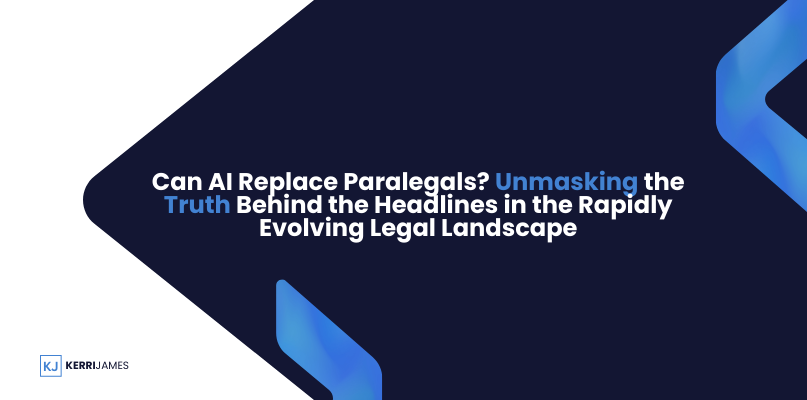The legal profession, long regarded as a bastion of tradition, precedent, and human judgment, is at a crossroads. A technological revolution, powered by the relentless march of artificial intelligence (AI), is transforming the legal landscape, generating both fervent excitement and understandable apprehension among seasoned attorneys, aspiring paralegals, and everyone in between.
Headlines breathlessly proclaim that robots are poised to replace lawyers and AI is on the verge of taking over courtrooms, leaving human legal professionals in the dust. If you’re a paralegal, or a bright-eyed student with dreams of joining the legal field, you might be starting to sweat, picturing robotic arms stamping documents and emotionless AI voices reciting case law in monotone. Meanwhile, you’re left pondering your next career move.
But take a deep breath, and let’s cut through the hype and fear-mongering. While it’s undeniably true that AI is poised to revolutionize the legal profession, it’s not about replacing human legal minds altogether. Instead, it’s about forging a powerful, symbiotic partnership—a fusion of human ingenuity and artificial intelligence, where each complements and amplifies the other’s strengths.
Remember the dawn of the spreadsheet era? Back then, accountants nervously eyed those digital grids, fearing they spelled doom for their profession. But spreadsheets didn’t replace accountants; they empowered them, becoming indispensable tools that enabled them to work more efficiently, strategically, and accurately. AI in law is poised to follow a similar trajectory, evolving into a sophisticated, ever-evolving toolkit for the modern paralegal.
Navigating the AI Revolution: Understanding the Capabilities and Limitations of Legal Tech
Before we dive headfirst into the “Will AI replace paralegals?” debate, let’s take a closer look at what AI can actually do—and perhaps more importantly, what it can’t do—in the legal realm:
AI’s Strengths: Unveiling the Power of Automation and Data-Driven Insights
-
The Document Whisperer: Taming the Ever-Growing Mountain of Legal Data:
Legal professionals are drowning in a sea of documents—contracts, discovery materials, legal research, pleadings, corporate records—the list goes on. Manually sifting through these mountains of data is often tedious, time-consuming, and prone to human error. Enter AI-powered document review tools, capable of analyzing vast quantities of information at superhuman speed. These tools can identify key information buried in thousands of pages, flag potential issues and inconsistencies, extract relevant data points, and even summarize complex legal language into digestible summaries. The result? Time saved, efficiency boosted, and the risk of costly human error significantly reduced.
-
The Research Ninja: Navigating the Labyrinthine World of Legal Precedent with Speed and Precision:
Remember those late nights hunched over law books or squinting at computer screens, desperately trying to unearth that one obscure but critical legal precedent? AI-powered legal research platforms are changing the game. These platforms can sift through decades of case law, statutes, regulations, and legal scholarship in a fraction of the time it takes a human, identifying relevant cases, highlighting key legal principles, and even predicting how courts might rule on similar cases in the future. This allows legal teams to build stronger cases, anticipate opposing arguments, and develop more effective legal strategies.
-
The Administrative Assistant Extraordinaire: Streamlining Tasks and Freeing Up Time for Higher-Level Thinking:
Paralegals often juggle a myriad of administrative tasks, from scheduling meetings and managing calendars to organizing files, preparing routine legal documents, and tracking deadlines. While these tasks are essential, they can be time-consuming and detract from the more strategic, analytical aspects of the job. Machine-driven automation can master many of these tasks; freeing up valuable time for paralegals to focus on more complex, strategic work that requires human judgment, creativity, and client interaction.
-
Predictive Power: Leveraging Data to Anticipate Outcomes, Assess Risk, and Shape Strategy:
AI algorithms, powered by machine learning, are being trained on vast datasets of legal information, enabling them to identify trends, patterns, and correlations that humans might miss. This predictive power allows legal teams to assess the strengths and weaknesses of their cases, develop more realistic expectations, make more informed decisions about litigation strategy, and even predict the likely outcome of a case with increasing accuracy. While AI can’t predict the future with absolute certainty, it can provide valuable data-driven insights that inform decision-making and mitigate risk.
The Human Advantage: Where AI Falls Short and the Value of Paralegals Shines Through
While AI is undeniably a powerful force in the legal field, it’s not a magic solution, nor is it a replacement for the essential human elements of judgment, empathy, creativity, and ethical reasoning that lie at the heart of the legal profession:
-
The Human Connection: Forging Trust and Understanding in a Technology-Driven World:
Law is, at its core, a human-centered profession. Clients facing legal challenges—whether it’s a family navigating a divorce, an entrepreneur embroiled in a contract dispute, or a victim seeking justice—need more than just cold, hard legal expertise. They need empathy, compassion, a listening ear, and a genuine human connection they can trust. AI can’t replicate the warmth of human interaction, the ability to build rapport, the sensitivity to navigate emotionally charged situations, or the intuition to understand unspoken concerns. Paralegals excel at building these crucial client relationships, providing support and guidance during what is often a stressful and confusing time.
-
The Strategic Mind: Seeing the Big Picture, Connecting the Dots, and Crafting Creative Solutions:
Paralegals are more than just taskmasters; they are strategic thinkers who work alongside attorneys to analyze information, anticipate challenges, identify potential pitfalls, and develop innovative legal strategies tailored to the unique circumstances of each case. AI can provide data, insights, and recommendations, but it’s the human mind that excels at seeing the bigger picture, connecting seemingly disparate pieces of information, thinking outside the box, and devising creative solutions that AI algorithms might overlook. Paralegals, with their deep understanding of the law and their ability to think strategically, play a crucial role in this process.
-
The Ethical Compass: Navigating the Moral Gray Areas Where Algorithms Fear to Tread:
Legal work is rarely black and white. It often involves grappling with ethical dilemmas, weighing competing interests, making judgment calls in ambiguous situations, and advocating for what is right, not just what is legal. While AI can analyze data and identify potential ethical concerns, it lacks the moral compass, the nuanced understanding of human behavior, and the ability to make judgments based on values, principles, and context—qualities that are essential for making sound ethical decisions in the complex, messy real world of law. Paralegals, guided by their ethical training and their understanding of the legal profession’s responsibility to uphold justice and fairness, play a vital role in ensuring that legal work is conducted ethically and responsibly.
-
The Adaptability Advantage: Thriving in a Constantly Evolving Legal Landscape:
The legal field is constantly changing, shaped by new laws, emerging technologies, evolving societal norms, and shifting economic realities. AI, while powerful, is often limited by the data it’s trained on and may struggle to adapt to novel situations or legal issues that fall outside its existing knowledge base. Humans, on the other hand, are wired for adaptation. We can learn from new experiences, apply knowledge to unfamiliar situations, and find creative solutions to unexpected challenges. This adaptability will be increasingly valuable in the legal profession, as AI takes on more routine tasks and legal professionals are called upon to handle more complex, nuanced, and unprecedented legal issues.
Embracing the Future: How Paralegals Can Thrive in the Age of AI
The legal profession, like many industries touched by the transformative power of AI, stands at a pivotal crossroads. The future is not about AI versus humans; it’s about AI empowering humans. The most successful legal professionals of tomorrow will be those who embrace AI as a powerful ally, not a menacing competitor, and who continuously adapt their skills to thrive in this evolving landscape.
So, how can aspiring paralegals prepare for a future where AI is an integral part of the legal profession?
The key lies in honing those uniquely human skills that will remain in high demand, even as AI takes on more routine tasks:
-
Tech-Savviness: Becoming Fluent in the Language of Legal Technology:
The legal tech landscape is evolving at breakneck speed, with new tools and platforms emerging all the time. Paralegals who are comfortable navigating this landscape, learning new software, and adapting to emerging technologies will be highly sought after. Embrace the opportunity to become familiar with common legal AI tools, stay informed about new developments in legal tech, and view continuous learning as an investment in your future success.
-
Critical Thinking: Sharpening the Mind for Analysis, Insight, and Problem-Solving:
AI can process information, but it’s the human mind that excels at critical thinking—analyzing data, identifying patterns, drawing inferences, spotting inconsistencies, and formulating sound judgments. Sharpen your critical thinking skills by actively engaging in thoughtful analysis of legal issues, questioning assumptions, seeking diverse perspectives, and embracing intellectual curiosity.
-
Client Communication: Mastering the Art of Human Connection in a Digital Age:
As AI becomes more prevalent in law, the ability to connect with clients on a human level, build trust, and communicate effectively will be more valuable than ever. Hone your communication skills, both written and oral, to convey empathy, build trust, explain complex legal concepts in clear, understandable language, and advocate effectively for your clients.
-
Adaptability and a Growth Mindset: Embracing Change as the Only Constant:
The only certainty in the future of work, especially in a field as dynamic as law, is change. Cultivate a growth mindset—a belief that your skills and abilities can be developed through dedication, hard work, and a willingness to embrace new challenges. View setbacks as learning opportunities, and approach change not with fear, but with curiosity and a desire to adapt and grow.
The Verdict
The legal profession is not going away, but it is evolving at an unprecedented pace, driven by technological advancements, changing client expectations, and a dynamic legal landscape. The most successful paralegals of tomorrow will be those who embrace AI as a powerful ally, not a menacing competitor, and who continuously adapt their skills to thrive in this evolving landscape. By mastering these technologies and developing in-demand skills, you’re not just staying afloat—you’re positioning yourself to ride the wave of change and build a rewarding, future-proof career in the exciting world of law.










